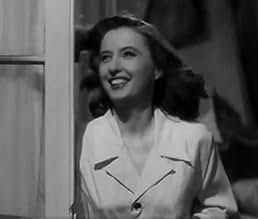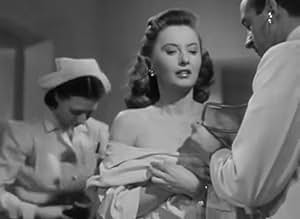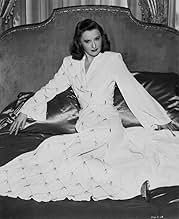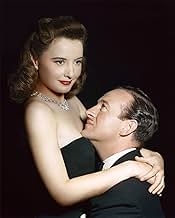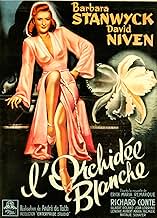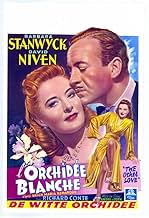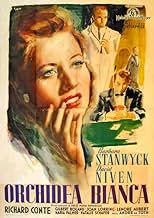अपनी भाषा में प्लॉट जोड़ेंKaren Duncan, a seriously ill concert pianist, enters a Swiss sanatorium where she's attracted to Dr. Tony Stanton. Ignoring his warnings about resting, she leaves for Monte Carlo with Paul ... सभी पढ़ेंKaren Duncan, a seriously ill concert pianist, enters a Swiss sanatorium where she's attracted to Dr. Tony Stanton. Ignoring his warnings about resting, she leaves for Monte Carlo with Paul Clermont despite possibly fatal consequences.Karen Duncan, a seriously ill concert pianist, enters a Swiss sanatorium where she's attracted to Dr. Tony Stanton. Ignoring his warnings about resting, she leaves for Monte Carlo with Paul Clermont despite possibly fatal consequences.
- निर्देशक
- लेखक
- स्टार
- Restaurant Patron
- (बिना क्रेडिट के)
- Casino Patron
- (बिना क्रेडिट के)
- Casino Patron
- (बिना क्रेडिट के)
- Roulette Player
- (बिना क्रेडिट के)
- Casino Patron
- (बिना क्रेडिट के)
- The Florist
- (बिना क्रेडिट के)
- Townsman
- (बिना क्रेडिट के)
- Woman
- (बिना क्रेडिट के)
फ़ीचर्ड समीक्षाएं
Classical pianists and exclusive doctors were common themes in 1940s Hollywood but somehow in this film they don't jell. Academy Award winner (A Double Life), Miklos Rozsa's music score comes across well as a piece of heavy classical piano. Barbara Stanwyck displays a seldom seen ability as a pianist making it look very authentic. Niven by comparison is shown at the keyboard only once in an out of focus long shot and is obviously bluffing his way through. As for his doctor part, it is evident that he never seems happy in it. It is a rôle which Claude Rains had excelled at previously in "Now Voyager", here he could have played it to perfection so lifting the film out of its mediocrity. It's left to Stanwyck to carry the film.
Not one to rush to watch but interesting as a period piece and a chance to see two great stars of their time.
A torrid but never horrid romantic movie, what was called then a "woman's picture" and is now in the category of "chick flic." Which is what makes it worth watching right there--it's dripping with love and longing and ideals gone astray. It's set in a sanitarium the Swiss Alps and is grand as well as comforting. And it stars Barbara Stanwyck as a world famous pianist, and she pulls every scene up a notch. The men are less compelling: David Niven is necessarily dry and reserved (and no great contribution to the romance), and Richard Conte is supposed to be the Italian love idol but in fact he's dry and reserved, too, unnecessarily.
The plot is based on a short story by the uneven but legendary German writer Erich Maria Remarque (who is neither a woman nor French), whose work is the basis of several movies, notably the pacifist WWI novel, "All Quiet on the Western Front." I say all this because the one clear flaw in this movie is the plot, the Remarque part of it. In a way, the idea of going to a t.b. clinic to get better or die (the two options equally likely back then) and having an arrogant famous woman face her mortality, sounds like a no-brainer. And her back and forth, her rebellion, her falling in love (tepidly) or falling in lust (still rather tepidly) is great stuff not quite exploited. And there is no real turn of events. It plays itself out, beautifully but inexorably.
That is, this is a really warm, gorgeous movie, with photography by Victor Milner, who had just finished two cinematic masterpieces ("It's a Wonderful Life" and Stanwyck's previous film, "The Strange Love of Martha Ivers"). And the music is great (of course), led by Miklos Rozsa, an old world high romantic composer. You want to be there, and you relate to Stanwyck's dilemma. It's a great movie in its bones, but never quite getting off the ground. Yet it is about stuff that matters: acceptance and deception in the face of death, from several sides. And it is, in fact, about true love of some highly idealized, self-sacrificing kind.
But Three Comrades had Frank Borzage directing it and that was the man for these films. His touch on bittersweet romances is as apparent and obvious as Alfred Hitchcock with suspense. This film would have raised a few notches in ratings had he directed it. And of course Sullavan would have aced the part of the tubercular heroine.
As it is Stanwyck is not bad in the role of a patient of Dr. David Niven at a Swiss sanitarium for tuberculosis. Niven is having a lot of trouble keeping his professional decorum with Stanwyck, but the doctor does win over the potential lover. Stanwyck doesn't realize how sick she is just as Sullavan didn't realize it in Three Comrades. She's a classical concert pianist and the enforced rest is rusting her technique.
The first chance she gets she runs off with racing driver Richard Conte who she doesn't tell how sick she is. But in the end Conte proves to be a stand-up guy.
There is also a very touching performance from Joan Lorring as a singer who is also a patient in the sanitarium. Her death just about pushes Stanwyck over the edge.
Barbara and the cast acquit themselves well, but Frank Borzage could have made The Other Love a classic.
Of course, dying in so decorous a fashion would take a bite out of anybody's schedule. So our Babs cuts short her international concert tour, and checks into a plush clinic with a panoramic view of the Swiss Alps. There she meets David Niven, a handsome doctor who takes a more-than-professional interest in her case. Frankly, I found his fascination with Babs and her illness to be downright ghoulish - and couldn't help wondering if he was a closet necrophiliac.
Realising, perhaps, that Niven is far too lightweight to make a convincing leading man (at one point, I felt they should switch roles!) La Stanwyck runs away to Monte Carlo. There she starts living the high life with a tough, sexy racing driver (Richard Conte). Given the fact that she has only a few weeks left to live, I thought this was eminently sensible behaviour on her part. Ah, but her heart is calling her back to Niven and his Alpine clinic...
The Other Love is spectacularly well-made by unsung director Andre de Toth, and boasts a luscious Tchaikovsky-esquire score by Miklos Rozsa. But it's success is down to Barbara Stanwyck, who lends a much-needed note of toughness and reality to what would otherwise be a pure camp melodrama. Played by anyone else, our heroine would most likely drown in syrup long before succumbing to a weakness of the lungs.
क्या आपको पता है
- ट्रिवियाAlthough it is never stated in the film, Karen Duncan is suffering from tuberculosis (TB). One of the earlier treatments for TB was to place the patient in a healthy environment with continuous fresh air (often in a mountain or desert location), and to ensure that he/ she had a good diet and plenty of rest. This resulted in the establishment of many sanatoriums for TB patients (similar to the one run by Stanton) all over the world, .
- गूफ़When Stanton gives Karen an X-ray, neither he nor the nurse stand behind any radiation protection. However, in the 1940s, X-rays were not yet considered dangerous, and this technology was widely used. Shoe stores even used X-rays to measure customers' feet through the 1950s.
- भाव
Paul Clermont: Whither thou goest, so shall I!
Karen Duncan: That would be hard for both of us.
- क्रेज़ी क्रेडिटOpening credits prologue: SWITZERLAND
- इसके अलावा अन्य वर्जनThere is an Italian edition of this film on DVD, distributed by DNA srl, "STELLA DALLAS (Amore sublime, 1937) + ORCHIDEA BIANCA (1947)" (2 Films on a single DVD), re-edited with the contribution of film historian Riccardo Cusin. This version is also available for streaming on some platforms.
- साउंडट्रैकÉtude No. 3, Un sospiro
Music by Franz Liszt
टॉप पसंद
- How long is The Other Love?Alexa द्वारा संचालित
विवरण
- रिलीज़ की तारीख़
- कंट्री ऑफ़ ओरिजिन
- आधिकारिक साइटें
- भाषाएं
- इस रूप में भी जाना जाता है
- Erich Maria Remarque's The Other Love
- उत्पादन कंपनी
- IMDbPro पर और कंपनी क्रेडिट देखें
- चलने की अवधि
- 1 घं 35 मि(95 min)
- रंग
- पक्ष अनुपात
- 1.37 : 1

